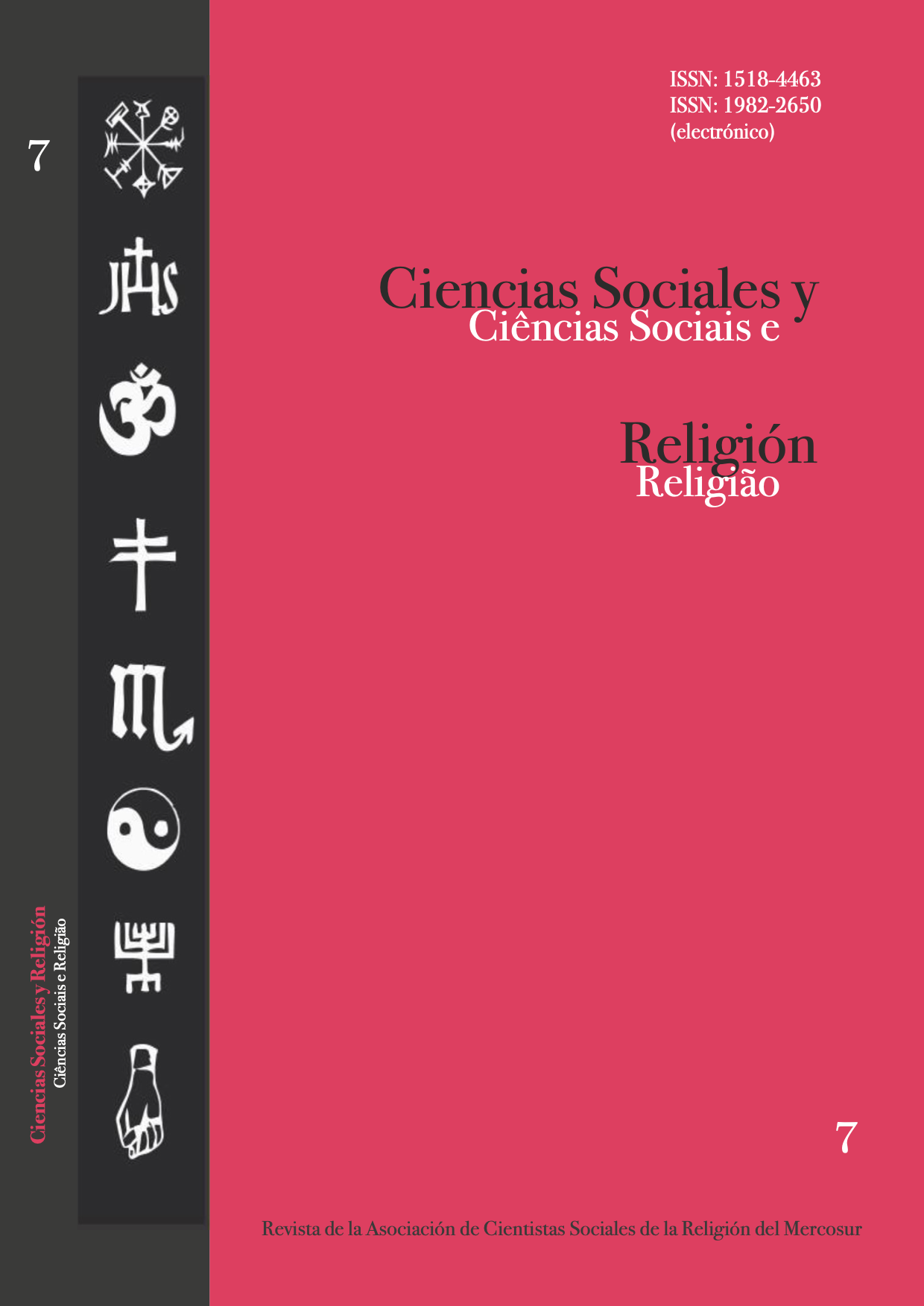Abstract
This article is a reflection on how Indian cultural references circulate onthe West, through social processes better understood under the notion ofGlobalization. The widespread of Indian religious elements and practices acquiresits meaning as one of the cultural dimensions of the globalization process. Thefirst issue to be addressed is the clear difference between the viewpoint of theleaders of these movements and that of their audience. This fundamentaldiscontinuity enables the existence of a double between between, on the one hand,an ocidentalizing India, in certain places and times, and on the other hand, anorientalizing West, with its own places and times. We conclude with an interpretationmodel of this cultural transit, which generates a circulation of Indian products,habits, beliefs and values throughout various parts of the world, including LatinAmerica. Consequently, we find a wide market of cultural goods, motivated andkept by the universalization of Indian sects.
References
BERGER, Peter. A dinâmica cultural da globalização. In: Berger, Peter & HUNTINGTON, Samuel.(orgs) Muitas globalizações: diversidade cultural no mundo contemporâneo. Rio de Janeiro: Record, 2004. p. 11- 27.
CAMPBELL, Colin. A orientalização do Ocidente. Religião e Sociedade. Rio de Janeiro: ISER, 18/1,1997, p. 05-22.
CHATTERJEE, P. The nation and its fragments. Princeton University Press, 1993.
DUMONT, Louis. Homo Hierarchicus: o sistema de castas e suas implicações. São Paulo: EDUSP, 1992.
DUMONT, Louis. Ensaios sobre o Individualismo. Rio de Janeiro: Rocco, 1985.
GUERRIERO, S. O movimento Hare Krishna no Brasil: A comunidade religiosa de Nova Gokula. Dissertação de Mestrado, PUC, São Paulo,1989.
GUERRIERO, S. A Iskcon no Brasil: Transformação Ocidental de uma Religião Védica e Incorporação de seus Traços Culturais na Sociedade Abrangente. ASSOCIAÇÃO NACIONAL DE PÓS-GRADUAÇÃO EM CIÊNCIAS SOCIAIS, 23º ENCONTRO ANUAL, 1999. Caxambu.
FARQUHAR, J.N. Modern religious movements in India, New Delhi: Munshiram Manoharlal, 1977. 2a. Edição.
KOPF, D. Keshub and chaitanya: in Medieval Bhakti Movements in India, New Delhi, Munshiram Manoharlal Publishers, 1989.
LYRA, Valéria. Integrando Corpo e Mente. Dissertação de mestrado em Antropologia, PPGAS/DAN/UNB. Brasília, 1987.
MADAN, T.N. (Org) Way of Life: essays in honour of Louis Dumont. Delhi: Mutilal Banarsidass Publishers, 1982.
MEHTA, Gita. Karma Cola: The marketing of the mystic east. London: Minerva Paperback, 1997. 10. ed.
MEHTA, Gita. Escadas e serpentes: um olhar sobre a Índia moderna. São Paulo: Companhia das Letras, 1998.
PEIRANO, Mariza. Uma Antropologia no Plural. Brasília: Editora Universidade de Brasília, 1991.
SARAN, A.K. Review of Contributions to Indian Sociology, N. 4. In The Eastern Anthropologist. London. v.15, N. 1, p. 53-68. 1962.
SAHLINS, Marshal. O pessimismo sentimental e a experiência etnográfica: porque a cultura não é uma espécie em extinção. In: MANA: Cadernos de Antropologia Social. Rio: Contracapa, 1997. Vol 3/1 – p. 41-73 e 3/2 - p. 103-150.
SATSVARUPA DASA GOSWAMI. Introdução à filosofia védica: a tradição fala por si mesma. São Paulo: Bhaktivedanta Book Trust, 1994.
SCHLUCHTER, Wolfgang. As origens do racionalismo ocidental. In: DE SOUZA, Jesé. (Org) O malandro e o protestante: a tese weberiana e a singularidade cultural brasileira. Brasília: EDUNB, 1999.
SINGER, Milton. When a Great Tradition Modernizes. Chicago: The University of Chicago Press, 1972.
SRNIVAS, Mysore Narasimha. Social change in modern India. Califórnia: The University of Califórnia Press, 1966.
SRINIVAS, Tulasi. “Um encontro com o destino”: Globalização cultural na Índia. In: Berger, Peter & HUNTINGTON, Samuel. (Orgs.). Muitas globalizações: diversidade cultural no mundo contemporâneo. Rio de Janeiro: Record, 2004, p. 109-140.
SILVA DA SILVEIRA, Marcos. Hari Nama Sankirtana: Etnografia de um processo ritual. Série Antropologia N. 277. Brasília: Universidade de Brasília, 2000.
SILVA DA SILVEIRA, Marcos. Max Weber e o movimento Hare Krishna. In Sociologia das Adesões: novas religiosidades e a busca místico-esotérica na capital do Brasil. SIQUEIRA, D. & LIMA, R. (Orgs.). Rio de Janeiro: Garamond, 2003, 1ª ed., p. 267-293.
TAMBIAH, S.J. The renouncer’s individuality and community. In: MADAN, T.N. (Org.). Way of life: king, householder, renouncer. New Delhi: Vikas Publishing House, 1982. 2ª ed.
TURNER, Victor. Dramas, fields, and metaphors. Cornell University Press, 1975.
VELHO, Otávio. Globalização: antropologia e religião. In: ORO, Ari Pedro; STEIL, Carlos Alberto (Orgs.). Globalização e Religião. Petrópolis: Vozes, 1997. p. 25-42.
WEBER, Max. The Religion of India. Illinois: The Free Press, 1958.
WEBER, Max. Ensaios de Sociologia. Rio de Janeiro: LTC, 1982. 5. ed.

This work is licensed under a Creative Commons Attribution-NonCommercial-ShareAlike 4.0 International License.
Copyright (c) 2020 Marcos Silva da Silveira
